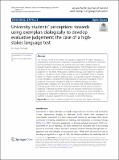Files in this item
University students’ perceptions towards using exemplars dialogically to develop evaluative judgement. The case of a high-stakes language test
Item metadata
| dc.contributor.author | Chong, Sin Wang | |
| dc.date.accessioned | 2022-02-21T13:30:11Z | |
| dc.date.available | 2022-02-21T13:30:11Z | |
| dc.date.issued | 2021-08-01 | |
| dc.identifier | 277617142 | |
| dc.identifier | dfca9a87-4e74-4a76-a93f-21deae1b5d87 | |
| dc.identifier | 85111497414 | |
| dc.identifier.citation | Chong , S W 2021 , ' University students’ perceptions towards using exemplars dialogically to develop evaluative judgement. The case of a high-stakes language test ' , Asian-Pacific Journal of Second and Foreign Language Education , vol. 6 , 12 . https://doi.org/10.1186/s40862-021-00115-4 | en |
| dc.identifier.issn | 2363-5169 | |
| dc.identifier.other | Bibtex: f038775ab6504a51862af52bd3090d24 | |
| dc.identifier.other | ORCID: /0000-0002-4519-0544/work/107287434 | |
| dc.identifier.uri | https://hdl.handle.net/10023/24916 | |
| dc.description | This study was funded by the Teaching Development Grant at the Education University of Hong Kong in 2018/2019 (T0203). | en |
| dc.description.abstract | The revived interest in the notion of ‘evaluative judgement’ in higher education is motivated by commitment of researchers and practitioners to effectively implement learning-oriented assessment and cultivate this high-order cognitive ability to develop students’ capacity for self-regulated learning. Recent studies have examined the affordances and constraints of using exemplars to develop students’ evaluative judgement in the fields of Education, Nutrition, Biology, and English for Academic Purposes. The present study, which focuses on use of exemplars in IELTS, analyzes patterns of teacher-students dialogues and 129 university students’ perceptions of using exemplars to develop their understanding of assessment standards of IELTS academic writing tasks. Qualitative data were collected through an online questionnaire, individual semi-structured interviews, and workshop observations. Findings suggest that the IELTS instructor/researcher utilized various interactive strategies to develop students’ hard, soft, and dynamic dimensions of evaluative judgement. Students identified affordances and limitations of using exemplars for language test preparation. Implications related to dialogic exemplar use to develop students’ evaluative judgement are discussed in light of the findings. | |
| dc.format.extent | 27 | |
| dc.format.extent | 1676078 | |
| dc.language.iso | eng | |
| dc.relation.ispartof | Asian-Pacific Journal of Second and Foreign Language Education | en |
| dc.subject | Exemplars | en |
| dc.subject | Evaluative judgement | en |
| dc.subject | Language test | en |
| dc.subject | Higher education | en |
| dc.subject | LB2300 Higher Education | en |
| dc.subject.lcc | LB2300 | en |
| dc.title | University students’ perceptions towards using exemplars dialogically to develop evaluative judgement. The case of a high-stakes language test | en |
| dc.type | Journal article | en |
| dc.contributor.institution | University of St Andrews. International Education Institute | en |
| dc.identifier.doi | 10.1186/s40862-021-00115-4 | |
| dc.description.status | Peer reviewed | en |
This item appears in the following Collection(s)
Items in the St Andrews Research Repository are protected by copyright, with all rights reserved, unless otherwise indicated.

